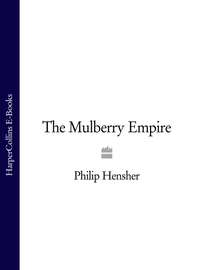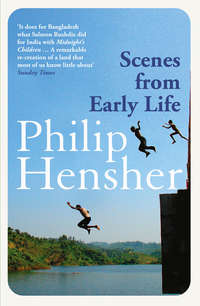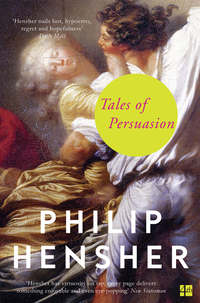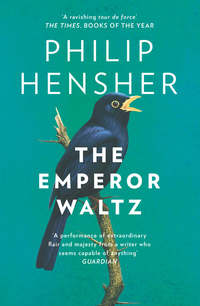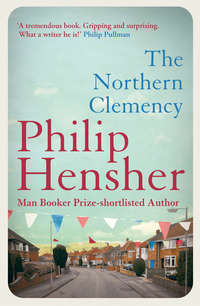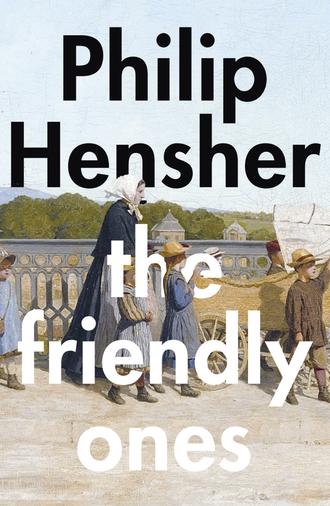
Полная версия
The Friendly Ones
‘That’s what Aisha is studying, how nice!’ Bina said, as if it were an extraordinary coincidence, rather than the way in which her niece might have met the man in the first place. ‘She was always so, so clever. Nazia, there is more in the car – I thought my husband was bringing it behind me but he has forgotten it. Some mangoes. They are Alphonse – in the boot, Tinku, quick, quick. Have you ever tried Alphonse mangoes, Mrs Browning? You must – they are sublime. And where is Aisha?’
‘I am studying in Cambridge,’ Enrico said. He was standing in the hall, as if to prevent them from moving through into the sitting room and through the French windows into the garden. ‘But I come from Sicily. Have you been to Sicily?’
Bina had spied Aisha in the garden, and now squeezed past Enrico with cries of joy. Tinku had gone outside again to fetch the mangoes; Bulu was drinking water in the kitchen. ‘It is a beautiful island, and the best climate in the world,’ Enrico was saying, as he trailed disconsolately behind a new arrival. He had not changed, and the clothes he had worn to read the paper all morning looked caught-out next to the party clothes of the guests.
‘And the boys!’ Sally Mottishead responded, flying out into the garden, glittering in the afternoon sun. ‘Look, you two! I remember you being born! Ada!’ For the moment Enrico was left alone; brilliant light fell on his dull surfaces and sank into brown or perhaps grey or perhaps a poisoned green; unhusbanded, unescorted, unentertained, unseen.
Nazia had planned the food for this afternoon with some care, not worrying about the confusion that was the inevitable result. There would be tea at first, and with tea some savoury snacks – there would be samosas, and falafels, and fried onion bites, and pickles, of course. But there would be some English things too, the sorts of things that went quite well with a Bengali tea, the Cornish pasties that Sharif had always liked to eat, and then even the pork pies that Aisha had eaten once by mistake and then gone on eating, with the English pickle and then with the Indian pickle. She had become quite a connoisseur of pork pies, and of piccalilli, and if people didn’t want to eat it, then they needn’t. There were sweets, too, from the shop in the Ecclesall Road, gulab jamun and sandesh and jelapi, and a chocolate cake and a cheesecake with redcurrants on top – the children liked that – and two big bowls of fruit to peel and eat and pick at.
Nazia thought that the barbecues would start producing food later on; they had been hot for an hour now, and once all the aunts and cousins had arrived and taken nibbles, there would be some grilled lamb chops and chicken breasts and slices of aubergine and courgette and halved tomatoes. She could not remember everything; that was what the caterers were there for, in their white shirts and beautifully pressed dark trousers, to keep the tea coming and not to forget anything that they had decided to supply. And as the afternoon went on, the tea that went with the pork pies and samosas and Cornish pasties and cake would give way to long drinks, squash and American fizzy drinks and perhaps, for the men, even a beer. ‘We are not in Bangladesh now,’ Sharif had said sonorously, before observing that the Italian Aisha had brought would probably think nothing but tea very strange, or imagine that they were deeply religious, or something of the sort. The Italian that Aisha had brought and was now neglecting was peering at the assortment of food as if he had never seen anything so awful in his life.
Nazia went over to where the twins and her daughter were talking to their next-door neighbour. They were picking fruit from the tree, peeling it and eating it with absorption.
‘We were so worried about your wife,’ Nazia said to the doctor next door. ‘I do hope she will make a recovery.’
‘Oh, she’s perfectly all right,’ the neighbour said, and he must have seen some questioning anxiety, not about his wife but about the children eating the fruit as Nazia raised her hands. ‘Don’t worry about that. Loquats. Perfectly edible. Mike Tillotson was always giving unlikely things a go. No, my wife – I’m sure she’ll be out of hospital shortly. Thank you for asking, much appreciated.’
‘We aren’t gardeners,’ Nazia said. She had persuaded the gardener to place rows of red, yellow, pink and purple flowers against the house: when they were finished, they would be thrown away, but they looked wonderful today. ‘I love the garden, but I couldn’t identify anything in it, really.’
‘Mike Tillotson tried to plant bamboo – that lasted three years and then died of root rot – and a bird of paradise flower, and that didn’t take at all. The olive tree’s still going over there. I would never have believed you could grow an olive tree at this latitude. He talked at one point about a mango tree.’
‘My father-in-law had a mango tree in his garden. Sharif will tell you ‒ he used to love it as a child,’ Nazia said.
‘Oh, yes,’ the doctor next door said, not very interested. ‘And then there was the jasmine ‒ that has good years and not such good years. It’ll be flowering in a couple of weeks.’
‘Which is the jasmine?’ Nazia said. The children had wandered off with a handful of the yellow fruit. She was keeping an eye on the staff’s preparations: they were solemnly arranging the cold food and peeling the clingfilm from the top of the salad bowls. It was all very well, this old man being friendly; she wished these retired people with nothing to do would choose their moment better. And now it was clear that Bina and Tinku and puking Bulu had not arrived too early, because through the door now were coming half a dozen engineering PhDs that Sharif must have asked, and Steve Smithers, and surely that was cousin Fanny, said to be driving from Manchester ahead of her parents and brother?
‘It’s the one just by the wisteria,’ the man next door was saying with a tone of mild incredulity. ‘You must know which is the wisteria, my dear. It’s the one –’
‘Oh, you must excuse me,’ Nazia said rudely, and with a smile turned towards the new arrivals. ‘Bina! Sister! Was that Fanny I saw? Where is she?’
‘She was here a moment ago,’ Bina said, waving the back of her hand at her face in an ineffective cooling gesture. ‘Where did she disappear to?’
‘There she is!’ clever Bulu said, pleased to be able to supply the answer to the riddle. ‘She went upstairs with Aisha.’
There they were, the two cousins, framed in the window of the bedroom upstairs, looking down and waving. Of course Aisha had been the first to see Fanny, and had whisked her off to get all the answers to all her questions, and catch up as much as they could before Fanny was absorbed into the aunts and cousins. She probably wanted to tell her about the Italian, now standing with the caterers, lifting and lowering slices of pork pie and shaking his head. He was like an antibody sourly reacting to the flow of the party. Nazia wished she knew what she could do with him. But there it was; and now Fanny and Aisha were drawing back from the window into the darkness of the room to talk. ‘Two gardeners once a week,’ Nazia said, in response to a question of Bina’s. ‘At five pounds an hour.’
‘Five pounds an hour for two gardeners!’ Bina cried. ‘In Cardiff, that would be impossible, impossible. In Cardiff, we can’t get gardeners for less than –’
‘Five pounds an hour each,’ Nazia said firmly. ‘Look, here’s the vice-chancellor – how nice of him to come. Excuse me, Bina.’ She was so fond of Bina, and hoped very much that Fanny and Aisha weren’t going to stay upstairs gossiping for hours, as if they were still little girls.
5.
‘Have a fruit,’ Aisha said, inside, giving Fanny a loquat to peel.
‘What the hell is that?’ Fanny said.
‘God knows,’ Aisha said. ‘Try it – it’s all right. It grows in the garden. I’ve just picked them.’
‘So this one,’ Fanny said, putting the unpeeled loquat down on the talc-dusty glass top of the dressing-table. ‘Is he The One, then?’ She picked up and dumped down again the silver-backed hairbrush, a green-tufted gonk and Aisha’s Cindy doll. The bedroom was not where Aisha lived and slept any longer, and she had preserved a few fossils of a previous life here; the books on the shelves were not the detailed histories of genocide she worked with, or mostly not, but A-level economics textbooks, an English classic or two and fervently worn copies, fifteen years old, of a twelve-part series about a pony detective. The Cindy doll on the kidney-shaped dressing-table, which Fanny and Aisha had dressed and involved in long fantastical adventures, had survived too as a souvenir of a single and remote experience, like a dangerous illness; Fanny picked it up and put it down again.
‘Is who the one?’ Aisha said, and then, in a sing-song voice, ‘Who in the world can you be talking about, Fanny?’
‘Don’t call me Fanny,’ Fanny said. ‘Everyone calls me Nihad, these days. Mummy doesn’t know why people laugh when she talks about her Fanny. They’re driving behind me, very slowly. Should be here before nightfall. Bobby wanted to come with me, but I insisted.’
‘You’re such a cow,’ Aisha said. ‘You could be the last woman in England to be called Fanny. It would be quite distinguished.’
They were only second cousins, and had always lived fifty miles away from each other, on either side of some range of hills that most English people thought of as an insurmountable barrier. But they were also only three weeks different in age; the aunts and cousins and uncles had shuttled backwards and forwards, that autumn of 1968, visiting Aunty Rekha’s second baby in Manchester, in their neat little semi-detached in Cheadle, then back again to Sheffield where Nazia’s first baby was living in a flat over a newsagent’s shop. (All this was Nazia’s favourite story. Aisha could retell it without effort. It was almost as if she herself had been there.) Rekha and Rashed had been very kind to their cousins, cousin Sharif finishing off his engineering PhD with not a lot of money, and had passed on all sorts of baby clothes; they had said they were passing on baby clothes, Nazia had explained afterwards, but baby Fanny was exactly the same age as Aisha, so they must have bought an extra Babygro and given it as a present, along with little donations of money that had, Nazia always explained, been very handy at the time. Of course they hadn’t seen each other when they were very tiny, after Nazia and Sharif and baby Aisha had moved back to Bangladesh, or East Pakistan as it then was, and had stuck it out in Nana’s house in Dhanmondi all through the war in 1971 and the troubles afterwards. But when things really changed in 1975, they had decided to come back to England, and Aisha and Fanny/Nihad had been seven years old; they had seen a lot of each other, and had been best friends always. For fifteen years they had talked about The One; he was Adam Ant, he was Marcus Cargill over the road, he was the Duc de Sauveterre, he was Mr York, who was a student teacher in French at Aisha’s school (she found out where he lived, or lodged, and they played in the playground opposite for almost four hours until he came out and she could say, ‘Hello, Mr York – this is my cousin Fanny.’ There had been a row when they got home and had missed lunch and tea and the police had almost been called). They had made up stuff about even Aunty Sadia’s son Ayub, though neither of them had ever been allowed to meet Aunty Sadia because of what Uncle Mahfouz had done in 1971, and they weren’t even very sure how old cousin Ayub was or even if he definitely existed. Still, he had been The One for a while. He had also been the son of the manager of the hot, tree-dappled camping ground in the Cévennes and the owner himself of the large manor house in Umbria where they had gone on holiday only two years before, just after they had finished their degrees. It would be nice to do it before they started the next phase, have a proper holiday in Italy, their parents had suggested. Aisha was going to Cambridge to do an MPhil before trying to get into the UN or Amnesty or something like that, Nihad/Fanny to do her law conversion course in Guildford after the degree in English she’d insisted on. The owner of the yellow-stone farmhouse in Umbria had, surprisingly, been no more than thirty-two or -three, grizzled and tanned but a real Duc de Sauveterre, gorgeous, they had agreed. He had made up for the plague of little scorpions that infested the house; he, irresistibly, had been seen outside the kitchen door of his own house, just down the hill, shirtless and oiling a shotgun as if grooming a dog in his own dumb, adoring perfection. ‘I feel,’ Nihad had said quite solemnly, one night in the big bedroom they were sharing during that holiday, ‘that for you, it might not be the Signor with his gun and his pecs and his house with the hundreds of scorpions. But it might very well be an Italian.’
‘Mummy would have a fit,’ Aisha had said, giggling at the thought of the Signor.
Now, together, they looked out of the window at Enrico. He was on the lawn, raising his hands together, talking to a caterer who had just put down four teacups and was trying to excuse himself. By the fence, the twins, Bulu and Uncle Tinku and, for some reason, Aisha’s father’s co-author Michael Burns and his wife were eating the new fruit from the tree, and the next-door neighbour was explaining something. Why couldn’t Enrico go and talk to them?
‘I met him in a seminar,’ Aisha said. ‘He took me for a cup of tea afterwards.’
‘What are his pecs like?’
‘Oh, if you –’
‘What was the seminar about? The one you met him at?’
‘About Pakistan,’ Aisha said. ‘And military law. I have an awful feeling he thought I was Pakistani or something. He found out I wasn’t, though. He was the only one who had done any of the reading we were supposed to. Anyway.’
‘I heard baby Camellia was coming this afternoon.’
‘Can’t wait,’ Aisha said.
6.
‘And here is Sharif-uncle,’ Dolly said to her baby Camellia, coming along at a steady pace – she must be two now, and in a party dress rather than the padded-solid H-shaped control garment they remembered from last time. She looked at them suspiciously, and turned her face into her mother’s thigh, clutching for safety. ‘And cousins Raja and Omith, you’ve never met them before, but they’re your special twin-cousins. Oh, Camellia, don’t be like that. She was perfectly all right ten minutes ago, chatting away, talking about her twin-cousins, she knows all about you, boys, asking if there would be cake. No, Camellia, don’t pull like that at Mummy – and what on earth?’
Dolly was shy with those outside the family circle, but dictatorial towards those she had grown up with or seen born; she had made an effort with her husband, Samir, although as the son of her daddy’s oldest colleague, she had really always known him. The sight of her altering at a stroke from bold instruction to inward-twirling wallflower as Samu came in was the favourite story of her brothers and cousins; as the story continued, it took a few months, perhaps even a year, before she started telling him what to do in the same way that she did with everyone else. Samu was quite cheerful about it, but he must sometimes have wondered who it was he had married. Now Dolly, dressed up for a family party in a dark blue sari with a silver edge, was finding her behaviour hard to calibrate. Was the neighbour within the social group or outside it? He was on the other side of the fence up his ladder, and therefore might be ignored; but he was apparently on speaking terms with the others. Dolly’s behaviour depended on this judgement: if she could not ignore this unfamiliar presence, she would search like baby Camellia for a thigh to hide her face in, would fall silent or, more probably, go off to somewhere safer where she could boss Samu and her big brother Sharif.
‘Everyone here!’ she said boldly. ‘Fanny and Aisha – is that Aisha’s friend? We heard about him – and the Manchester lot on their way, and where is Bina, and Sharif has made such a lovely party, look at all that lovely food – and … No Mahfouz and Sadia. No, of course not. I don’t know why I thought …’
‘And this must be baby Camellia,’ a voice said. ‘I’ve been hearing a lot about you, young lady.’
The question was answered; the voice belonged to the old Englishman up a tree. For a moment Dolly and Camellia turned in on each other, clinging. But then she remembered herself, and said who she was. ‘You must be their neighbour,’ she went on, and the twins giggled.
‘Yes, we’ve been here for over thirty years,’ the man was saying. ‘My daughter was the age of your little one, there, and I remember my son was only six months old – we had two more soon afterwards. Got children of their own now. Some of them. It was a hard winter, that first one – we were the first in the avenue to install central heating. An oil boiler. The garden was really quite abandoned, overgrown.’
‘These are so good!’ Dolly said, ignoring the man and turning to her relations. ‘But the stone is big. Camellia, do you want one? Do you? Peel one for her, Raja, but take the stone out first. Small pieces – it’s too big for little girls to have in their mouths. Do you like it, darling? Is it too sour?’
‘Hello,’ the Italian said, coming over and holding his hand out. ‘I am Enrico. I am the friend of Aisha, staying for this weekend. I am from Sicily but studying at the University of Cambridge.’
But Dolly could only giggle and hide her face behind the fold of blue and silver cloth.
7.
In some ways Nazia thought it would be best to ask Sadia and Mahfouz to one of these gatherings. She missed Sadia ‒ she could admit it to herself. They had been such friends back in the 1960s, when they’d come back from Sharif’s PhD, and Sharif’s big sister had been such a help with everything, living so near in Dhaka. Without Sadia, there was something unexplained about Sharif: he just had two little sisters, Bina and Dolly, but he hardly behaved like the protective older brother. She had always had to talk him into doing things, into moving house because they needed an extra room now that there were twins, into moving back to England from Bangladesh after everything changed in 1975 and it was clear there would be no future in the country for people like them. It was the same decision that Sadia and Mahfouz must have made at the beginning of 1972, upping sticks and turning up in England (as they had discovered after a year or more). But they had had a different reason: the opposite reason. What was missing from any explanation of how Sharif was, with his lazy manner, his feet out in front of the television, his pensive silences and slow smiles, as if they were students in need of forgiveness, was the presence of that oldest sister. Nazia missed her. Sharif would never allow himself to, and now nobody else would be able to understand if they reached out and made contact with Sadia. They hadn’t seen them since Mother died. Nazia didn’t believe that Tinku and Bina especially would be able to understand if they had walked in this afternoon with dear little green-faced Bulu, and found Sadia there under their elm tree, eating lamb chops with her husband, Mahfouz, the murderer and the friend of murderers. There was no excuse for what Mahfouz had done. As Tinku said, in a proper world, he would have been in prison or hanged. But there it was. Nazia could not forget that she had always liked Sadia. She was not a murderer.
‘What are you thinking?’ Bina asked. ‘You shivered just then.’
‘Oh, there’s so much to do,’ Nazia said. ‘A new house. I just haven’t the time or the energy.’
‘It is so so lovely!’ Bina said. ‘You have a real gift for making a nice home. I wish –’
‘Oh, you say such kind things, sister,’ Nazia said distractedly. ‘I must go and say hello to Aisha’s friend Caroline’s mother. Excuse me.’ Did she have that gift? The man next door, the marginal and somehow disturbing presence at their party, perhaps had that gift. There was a curious smell about him she had noted, wafting across the fence; it was not the smell of gardening, of old clothes and soil and some sweat; it was not the smell that might be a possibility, the smell of medicine. She remembered he was the doctor next door, as the Tillotsons had put it when they sold the house to them, but he was also retired. The smell was characteristic, she could tell, a smell of slight sweetness and decay. He was not in the party, and was not invited to the party, but stood aloof on the other side of a fence, genially chatting to anyone who came near. The smell she noticed was the smell of ease, of settlement. Nazia thought she would never reach that point of settlement, and in thinking that she and Sharif had found the house that would make them settle, merely because they were now in the largest house they had ever lived in, was to deny their history and their nature. Sharif had gone to England to do his PhD; he had returned to Dhaka; and after the military had taken over, they had come back to England and a professorship for Sharif at the university. Everyone they knew, or were related to, had made similar moves, from one side of the world to another, alighting in rented or leased houses, throwing parties to celebrate their arrival. They were unhoused beings, spending money on new curtains from time to time.
‘But you look so sad!’ Bina said, to keep Nazia a moment longer. ‘What is it? Everything is perfect – the food, the weather, everything. What is it?’
‘Oh, nothing,’ Nazia said. ‘I was only thinking that the people you do all these things for – they are the ones who never appreciate any of it.’
Bina made a wave of her hand, an amused, dismissive, gracious wave, like the Queen at the end of the day on a Commonwealth tour. It was the same wave she had been making to Nazia for decades, ever since Nazia had married her big brother Sharif. She had made it in gardens in Dhaka, in libraries, in rented flats in Sheffield, wherever they had happened to be when they met and Nazia wanted to make some sort of point, as she so so often did. And then she turned and tried to join in with Dolly, who was explaining to the child that ‘He’s a retired doctor – very suitable – and I hear his wife is in hospital. Four children. And grandchildren. I don’t know what his name is. Nazia-aunty probably knows. We are so worried about our neighbours. No retired doctors for us. The problem really is …’
8.
On the terrace, Tinku and Sharif had pulled up a chair for Aisha’s Italian friend and, almost at once, Tinku had started an argument. The vice-chancellor was sitting, astonished; Sharif, too, watched, comfortably, enjoying it. Aisha had drilled it into her parents that they were not, repeat not, to start being Bengali and confuse having a friendly conversation with starting an argument. They were not for any reason allowed to discover what the Italian’s political beliefs were on a subject, in order to put the opposite point of view with maximum force. They were to behave like civilized people and say to their guest, ‘That’s very interesting,’ and move on to neutral subjects. She had been very firm on the principle of not behaving like Bengalis, and Sharif and Nazia, with heavy hearts, had agreed. Sharif felt they had been tiptoeing around with pathetic subservience, saying, ‘How interesting,’ every three minutes since four p.m. on Friday afternoon. He had had to make up for it by having a truly monumental discussion with Nazia about whether or not it was important to preserve the coal-mining industry in Britain, which started before bedtime on Saturday night, and resumed as soon as they woke up until it was time to go down for breakfast, after which they both felt very much better, and neither of them had said, ‘That’s very interesting,’ at all. Nazia had just got an exercise bike: she had discovered that she could do twenty minutes with no trouble at all, if Sharif came in and started in on whether Bangladesh should be expelled from the Commonwealth.
Aisha had not been allowed to extend her instructions to her aunts and uncles and cousins. ‘That,’ Nazia had said, ‘is too much.’ So Sharif was watching his little-sister’s husband, uninstructed, unseam the Italian from the nave to the chaps with a lot of enjoyment and interest. Tinku’s chosen subject was Italy.


